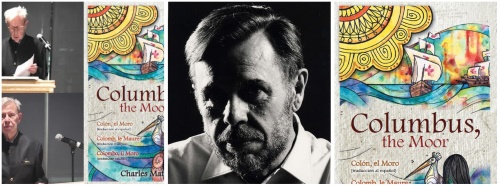– by Lasana M. Sekou.
PHILIPSBURG:--- Poet, renaissance scholar, dramaturge, novelist Charles Matz died at his home in Southampton, New York on February 12, 2021. He was 96.
He leaves his children, Margaret Matz (architect, New York), Charles “Carlino” Matz III (professor, NYIT; architect, New Jersey), and Clare Ann Matz (multimedia artist, film director, Italy). He leaves Antonio Lai da Teulada among family members; and a number of friends and colleagues.
“At House of Nehesi Publishers we are saddened by the passing of Professor Charles Matz,” said Jacqueline Sample, president of House of Nehesi Publishers (HNP). Columbus, the Moor by Charles Matz was published here by HNP in 2015 and launched to an international audience at the St. Martin Book Fair that same year.
It took courage for Matz to publish his definitive poetry in the Caribbean, said Sample, with the English original and the Spanish, French, and Italian translations in one book.
“Now Columbus, the Moor, his last published title, shares with us joy of knowing the poet. It places Charles Matz, as a US author, among the few to master the kind of Atlantic World epics that are rare pillars of the Caribbean and Latin American poetry,” said Sample.
Charles Matz as a poet, performer, and teacher was on the scene long before his introduction to the Caribbean. Audiences in the USA, and European cities, especially in Venice, London, Paris, and Madrid where he lived and worked, have known his work, especially in the theater.
In 1966, Matz taught creative writing at the University of Notre Dame, intent on fusing oral poetry and “electronic age” media, and founded the CAM Art Company.
After a stint in Italy — where, starting in 1968, Matz worked in theater and taught at the Istituto Universitario delle Lingue Moderne — the multi-media performance arts CAM settled in New York City in 1984.
In addition to obtaining his doctorate at Notre Dame, Matz studied at Rutgers University, Columbia University, and the Sorbonne. His education and daring work at CAM were arguably critical in his creation of the “shout poetry” that “dominated in rock-music concerts with its emotional impact.” (camartco.com)
Matz told HNP that the poetry form uses oral and music composition techniques “based in part on traditional forms from the European Mediterranean area and Africa.”
Matz contributed articles on contemporary artistic concepts to Opera News, Vogue, Testuale, and Digraphe-Mercure de France. Over the years his acquaintance with or work related to the likes of Ezra Pound, Peggy Guggenheim, Norman Mailer, and Andrea Zanzotto, could be seen as part of the avant-garde circles in which he moved.
To the Italian poet Zanzotto, “The literary works of Charles Matz are extremely complex. … What distinguishes his work is his plunging into the bottomless pit of lasting orality, the long, varied history of poetry-song-ritual.” (Columbus, the Moor)
In his poetry, he does indeed pour forth such a flux of words, ideas, and multiple language-use that it could leave any unsuspecting or willing reader in a literary rapture.
Columbus, the Moor, set on the day that Christopher Columbus and crew arrive in the “New World,” is such a work.
The Trinidadian literary critic Shivanee Ramlochan has called the book-length dramatic poem an “interpretive and lyrically lavish fusion of fact and speculation.” (Caribbean Beat)
In his poetry there are the inextricable dialogue, drama, visceral imagery, and music that tenant his theater, certainly to be found in his librettos. (youtu.be/f6TUebdX4tM)
So not by chance, in a comment about his poetry, the author Dr. Jay B. Haviser might have best summed up the work circle of a life well adventured: “Matz mystically takes us to those moments when the stars moved and gravity shifted, beyond the invisible to where dusty breath warnings … fell on deaf ears filled with grandeur.”
Charles Matz taught literature at Long Island University up to 2020—his specialties were Dante and Comparative Western Literature (chiefly Italian and French). He is a recipient of the Chevalier de la Légion d’Honneur of France.
Farewell, Professor Charles Matz.









